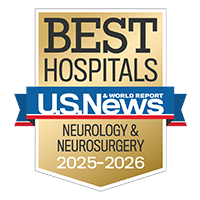Progressive Supranuclear Palsy

Overview
Progressive supranuclear palsy (PSP) is a rare brain disorder that causes dementia and problems with walking and balance. About 20,000 Americans — or one in every 100,000 people over age 60 — have PSP. Symptoms are similar to other degenerative diseases of the brain, such as changes in behavior and difficulty with speech. Another characteristic symptom is lack of control of eye movement. These symptoms are caused by a gradual deterioration of brain cells at the base of the brain in an area called the brainstem.
Patients tend to be middle-age or elderly. Men are affected more often than women. The disease can be difficult to diagnose because it's rare and sometimes mistaken for Parkinson's disease.
As PSP progresses, patients are at greater risk for complications, such as choking, pneumonia, head injury and fractures caused by falls. The most common cause of death is pneumonia. With good medical care, however, may patients with PSP live well into their 70s and beyond.
Our Approach to Progressive Supranuclear Palsy
Our team provides thorough evaluations and care for progressive supranuclear palsy. While there are no effective treatments yet, we are working to find them and can offer access to experimental therapies through ongoing clinical trials.
In addition, we treat patients with medications to improve symptoms. We may also recommend speech and physical therapy as well as devices such as weighted walking aids to prevent falling.
Awards & recognition
-

Among the top hospitals in the nation
-

Best in the West and No. 2 in the nation for neurology & neurosurgery
Signs & symptoms
Loss of balance while walking is the most common first symptom of progressive supranuclear palsy (PSP). Patients may have unexplained falls or a stiffness and awkwardness when walking. Sometimes, the falls seem like attacks of dizziness, which lead to an incorrect diagnosis of an inner ear problem.
Other early symptoms include a loss of interest in hobbies or recreational activities, increased irritability and forgetfulness. Patients may suddenly laugh or cry, be apathetic or have occasional angry outbursts for no apparent reason.
As the disease progresses, many patients develop blurry vision and problems controlling eye movements. Patients have trouble shifting their gaze downward and can have trouble controlling their eyelids, leading to involuntary closing of the eyes, prolonged or infrequent blinking, or difficulty opening the eyes. Another visual problem is difficulty maintaining eye contact during a conversation, giving the impression that the patient is hostile or uninterested.
In addition, speech usually becomes slurred. Swallowing solid foods or liquids can be difficult. In rare cases, some patients will experience shaky hands.
Diagnosis
An early diagnosis of progressive supranuclear palsy (PSP) is difficult because initial complaints typically are vague. PSP often is misdiagnosed because some symptoms are very much like those of Parkinson's disease, Alzheimer's disease and more rare neuro-degenerative disorders, such as Creutzfeldt-Jakob disease. Memory problems and personality changes may lead a doctor to mistake PSP for depression or even attribute symptoms to some form of dementia.
A thorough evaluation is important to diagnosis PSP. This involves an interview with you and another person such as a spouse, relative or close friend to provide examples of behavior and daily activities, physical testing for mobility and vision, and neuropsychological testing for evaluation of thinking and reasoning.
Treatments
Currently, there is no treatment for progressive supranuclear palsy (PSP). In some patients the slowness, stiffness and balance problems may respond to Parkinson's disease medications but the effect is usually temporary. Speech, vision and swallowing difficulties usually do not respond to drug treatments.
Simple lifestyle changes may benefit patients. For example, patients can use weighted walking aids to prevent a tendency to fall backwards.
Bifocals or special glasses called prisms are sometimes prescribed to remedy the difficulty of looking down and certain exercises can help keep the joints limber.
When a patient experiences severe difficulty swallowing and choking is a risk, a surgical procedure called a gastrostomy may be necessary. This surgery involves placing a tube through the skin of the abdomen into the intestine for feeding purposes.
UCSF Health medical specialists have reviewed this information. It is for educational purposes only and is not intended to replace the advice of your doctor or other health care provider. We encourage you to discuss any questions or concerns you may have with your provider.












